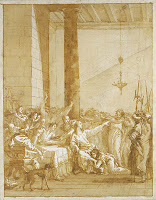Collect for Friday in the Fifth Week of Lent
O Lord, you relieve our necessity out of the abundance of your great riches: Grant that we may accept with joy the salvation you bestow, and manifest it to all the world by the quality of our lives; through Jesus Christ our Lord, who lives and reigns with you and the Holy Spirit, one God, for ever and ever. Amen.
“Then the whole people said, ‘May his blood be upon us and upon our children’"
Matthew 27: 25
As I reflected on Matthew 27: 1-66, which is the entirety of the chapter, I found myself going back to this very uncomfortable passage. It’s disturbing for a variety of reasons. Some scholars suggest that the verse was included in Matthew’s gospel to drive home the idea that the Jews were responsible for the crucifixion of Jesus – by including those present and their children, Matthew could be implicating an entire people. History has shown that these verses are, indeed, inflammatory and have given rise time and again to acts of outrage in the name of Christ.
There’s another way to view those verses, however, and that is through the lens of the uncomfortable truth they tell us about ourselves –
The morality of the herd is at work here – we see a large group bent on violence and bloodshed shouting for a violent execution. We know from reading the rest of the chapter that they will get what the want, and many will witness the execution and mock our Lord. If you are now feeling a bit smug and thinking to yourself, “Thank God we no longer live in such horrific times – what barbarity!” you better stop and think again. Go on-line and search images of lynching in the US, or check out the smiling “thumbs up” photos of soldiers with beaten or deceased bodies of detainees in Abu Garib, or look back to the public humiliation and terror carried out by the Nazis during days leading up to World War II. In each case, you will see images of happy, smiling people while others are being tortured, humiliated and destroyed.
We can bring this a bit closer to home. When we ourselves join in or stand by when another is insulted or murdered via character assassination, when we fail to speak a word of justice or truth, when we give in to entertainment and humor and activities that diminish human dignity, then we are participating, in a sense, in a crowd calling not for life, but for death, for the lowest common denominator.
Are these acts “visited upon our children”? Inasmuch as they help to create a culture where intolerance, hatred and humiliation are accepted, then this culture does, indeed, seep into the very fabric of our being.
The good news for us is that in Christ, there is an end to this, if we choose to follow Him. The message of the Passion, Cross and Resurrection shows us that redemptive suffering, laying down one’s life for love and the truth, and standing with the poor and oppressed will be for us the entry to hope, to new life, to resurrection.
We may do well to reflect on those times when we have been or are “part of the crowd”. We may do well to ask ourselves if we are passing on to others a culture of death or life.
The Rev. Scott Leannah
Rector





